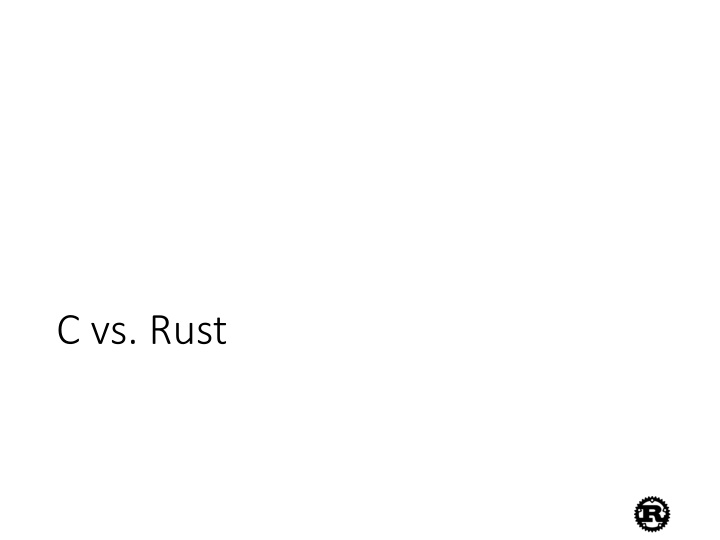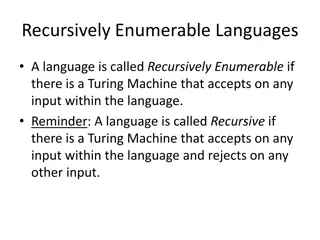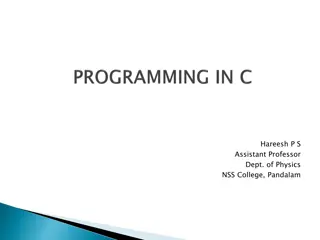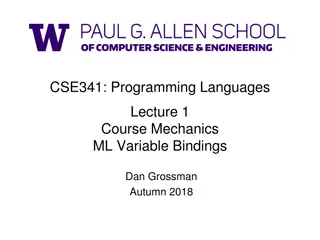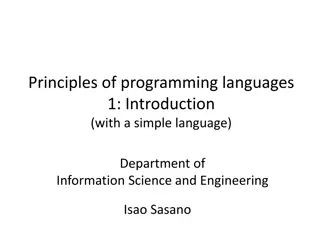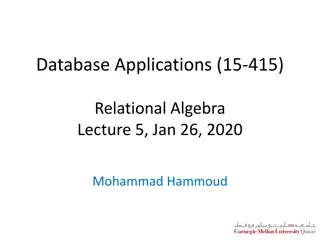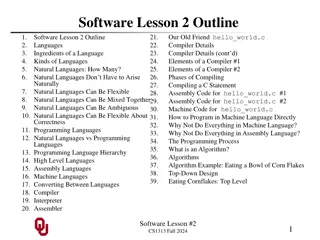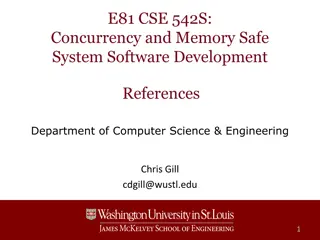Comparison of C vs Rust Programming Languages
C and Rust are programming languages known for their efficiency in resource-constrained environments. While C offers direct control over hardware and is favored by advanced programmers for its performance, Rust provides memory safety features that prevent common errors like null pointer dereferences and buffer overflows. Despite C's lightweight memory management, it is prone to type errors and memory-related issues. Managed languages like Java and Python solve some of these problems but come with their own overhead and limitations. For system programs requiring speed and minimal runtime overhead, choosing between C and Rust depends on the trade-offs between control and safety.
Uploaded on Sep 19, 2024 | 1 Views
Download Presentation

Please find below an Image/Link to download the presentation.
The content on the website is provided AS IS for your information and personal use only. It may not be sold, licensed, or shared on other websites without obtaining consent from the author.If you encounter any issues during the download, it is possible that the publisher has removed the file from their server.
You are allowed to download the files provided on this website for personal or commercial use, subject to the condition that they are used lawfully. All files are the property of their respective owners.
The content on the website is provided AS IS for your information and personal use only. It may not be sold, licensed, or shared on other websites without obtaining consent from the author.
E N D
Presentation Transcript
C (the good parts) Efficient code especially in resource-constrained environments Direct control over hardware Performance over safety Memory managed manually No periodic garbage collection Desirable for advanced programmers
But Type errors easy to make Integer promotion/coercion errors Unsigned vs. signed errors Integer casting errors
and Memory errors easy to make Null pointer dereferences Buffer overflows, out-of-bound access (no array-bounds checking) Format string errors Dynamic memory errors Memory leaks Use-after-free (dangling pointer) Double free Cause software crashes and security vulnerabilities.
Example: C is good Lightweight, low-level control of memory typedef struct Dummy { int a; int b; } Dummy; Precise memory layout void foo(void) { Dummy *ptr = (Dummy *) malloc(sizeof(struct Dummy)); ptr->a = 2048; free(ptr); } Destruction Lightweight reference .a = 2048 .a ptr .b Stack Heap
Example: C is not so good typedef struct Dummy { int a; int b; } Dummy; void foo(void) { Dummy *ptr = (Dummy *) malloc(sizeof(struct Dummy)); Dummy *alias = ptr; free(ptr); int a = alias.a; free(alias); } Use after free Aliasing Mutation Double free Dangling Pointer .a ptr .b alias Stack Heap
Solved by managed languages Java, Python, Ruby, C#, Scala, Go... Restrict direct access to memory Run-time management of memory via periodic garbage collection No explicit malloc and free, no memory corruption issues But Overhead of tracking object references Program behavior unpredictable due to GC (bad for real-time systems) Limited concurrency (global interpreter lock typical) Larger code size VM must often be included Needs more memory and CPU power (i.e. not bare-metal)
Requirements for system programs Must be fast and have minimal runtime overhead Should support direct memory access, but be memory -safe
Rust From the official website (http://rust-lang.org): Rust is a system programming language barely on hardware. No runtime requirement (runs fast) Control over memory allocation/destruction. Guarantees memory safety Developed to address severe memory leakage and corruption bugs in Firefox First stable release in 5/2015
Rust overview Performance, as with C Rust compilation to object code for bare-metal performance But, supports memory safety Programs dereference only previously allocated pointers that have not been freed Out-of-bound array accesses not allowed With low overhead Compiler checks to make sure rules for memory safety are followed Zero-cost abstraction in managing memory (i.e. no garbage collection) Via Advanced type system Ownership, borrowing, and lifetime concepts to prevent memory corruption issues But at a cost Cognitive cost to programmers who must think more about rules for using memory and references as they program
Rust and typing Primitive types bool char (4-byte unicode) i8/i16/i32/i64/isize u8/u16/u32/u64/usize f32/f64 Separate bool type C overloads an integer to get booleans Leads to varying interpretations in API calls True, False, or Fail? 1, 0, -1? Misinterpretations lead to security issues Example: PHP strcmp returns 0 for both equality *and* failure! Numeric types specified with width Prevents bugs due to unexpected promotion/coercion/rounding
Rust and typing Arrays stored with their length [T; N] Allows for both compile-time and run-time checks on array access via[] C Rust void main(void) { int nums[8] = {1,2,3,4,5,6,7,8}; for ( x = 0; x < 10; i++ ) printf( %d\n ,nums[i]); }
Rust and bounds checking But Checking bounds on every access adds overhead Arrays typically accessed via more efficient iterators Can use x86 loop instruction
Rust vs C typing errors Recall issues with implicit integer casts and promotion in C -1 > 0U 2147483647U < -2147483648 Rust s type system prevents such comparisons int main() { unsigned int a = 4294967295; int b = -1; if (a == b) printf("%u == %d\n",a,b); } mashimaro <~> 9:44AM % ./a.out 4294967295 == -1
Rust vs C typing errors Same or different? int main() { char a=251; unsigned char b = 251; printf("a = %x\n", a); printf("b = %x\n", b); if (a == b) printf("Same\n"); else printf("Not Same\n"); } mashimaro<> % ./a.out a = fffffffb b = fb Not Same
Rust vs C typing errors 201 > 200? #include <stdio.h> int main() { unsigned int ui = 201; char c=200; if (ui > c) printf("ui(%d) > c(%d)\n",ui,c); else printf("ui(%d) < c(%d)\n",ui,c); } mashimaro <~> 12:50PM % ./a.out ui(201) < c(-56)
Rust vs C typing errors In Rust, casting allowed via the as keyword Follows similar rules as C But, warns of literal problem before performing the promotion with sign extension #include <stdio.h> int main() { char c=128; unsigned int uc; uc = (unsigned int) c; printf("%x %u\n",uc, uc); } mashimaro <~> 1:24PM % ./a.out ffffff80 4294967168
Rust vs C typing errors Recall issues with unchecked underflow and overflow Silent wraparound in C int main() { unsigned int a = 4; a = a - 3; printf("%u\n",a-2); } mashimaro <~> 9:35AM % ./a.out 4294967295 Run-time check in Rust
Recall previous C vulnerability DNS parser vulnerability count read as byte, then count bytes concatenated to nameStr char *indx; int count; char nameStr[MAX_LEN]; //256 ... memset(nameStr, '\0', sizeof(nameStr)); ... indx = (char *)(pkt + rr_offset); count = (char)*indx; while (count){ (char *)indx++; strncat(nameStr, (char *)indx, count); indx += count; count = (char)*indx; strncat(nameStr, ". , sizeof(nameStr) strlen(nameStr)); } nameStr[strlen(nameStr)-1] = '\0'; What if count = 128? Sign extended then used in strncat Type mismatch in Rust char *strncat(char *dest, const char *src, size_t n); http://www.informit.com/articles/article.aspx?p=686170&seqNum=
Another C vulnerability 2002 FreeBSD getpeername() bug (B&O Ch. 2) Kernel code to copy hostname into user buffer copy_from_kernel() call takes signed int for size from user memcpy call uses unsigned size_t What if adversary gives a length of -1 for his buffer size? #define KSIZE 1024 char kbuf[KSIZE] void *memcpy(void *dest, void *src, size_t n); int copy_from_kernel(void *user_dest, int maxlen){ /* Attempt to set len=min(KSIZE, maxlen) */ int len = KSIZE < maxlen ? KSIZE : maxlen; memcpy(user_dest, kbuf, len); return len; }(KSIZE < -1) is false, so len = -1 memcpy casts -1 to 232-1 Unauthorized kernel memory copied out Type mismatch in Rust
Rusts Ownership & Borrowing Aliasing Mutation Compiler enforced: Every resource has a unique owner. Others can borrow the resource from its owner (e.g. create an alias) with restrictions Owner cannot free or mutate its resource while it is borrowed. No need for runtime Memory safety Data-race freedom
But firstmutability By default, Rust variables are immutable Usage checked by the compiler mut is used to declare a resource as mutable. fn main() { let mut a: i32 = 0; a = a + 1; println!("{}" , a); } http://is.gd/OQDszP rustc 1.14.0 (e8a012324 2016-12-16) 1 Program ended. rustc 1.14.0 (e8a012324 2016-12-16) error[E0384]: re-assignment of immutable variable `a` --> <anon>:3:5 | 2 | let a: i32 = 0; | - first assignment to `a` 3 | a = a + 1; | ^^^^^^^^^ re-assignment of immutable variable error: aborting due to previous error
Ownership and lifetimes There can be only one owner of an object When the owner of the object goes out of scope, its data is automatically freed Can not access object beyond its lifetime (checked at compile-time) struct Dummy { a: i32, b: i32 } Memory allocation fn foo() { let mut res = Box::new(Dummy { a: 0, b: 0 }); res.a = 2048; } Resource owned by res is freed automatically owns .a = 0 .a = 2048 .b = 0 res Heap Stack
Assignment changes ownership http://is.gd/pZKiBw
Ownership transfers in function calls struct Dummy { a: i32, b: i32 } fn foo() { let mut res = Box::new(Dummy { a: 0, b: 0 }); take(res); println!( res.a = {} , res.a); Compiler Error! } Ownership is moved from res to arg fn take(arg: Box<Dummy>) { } arg is out of scope and the resource is freed automatically
Borrowing You can borrow ownership of an object using the & operator in order to modify it (with some restrictions) You cannot borrow mutable reference from immutable object Or mutate an object immutably borrowed You cannot borrow more than one mutable reference (to support atomicity) You can borrow an immutable reference many times There cannot exist a mutable reference and an immutable one simultaneously (removes race conditions) The lifetime of a borrowed reference should end before the lifetime of the owner object does (removes use after free)
Borrowing example (&) You cannot borrow mutable reference from immutable object struct Dummy { a: i32, b: i32 } fn foo() { let res = Box::new(Dummy{a: 0, b: 0}); Error: Resource is immutable res.a = 2048; let borrower = &mut res; } Error: Cannot get a mutable borrowing of an immutable resource
Borrowing example (&) You cannot mutate an object immutably borrowed struct Dummy { a: i32, b: i32 } fn foo() { let mut res = Box::new(Dummy{ a: 0, b: 0 }); take(&res); res.a = 2048; } Resource is returned from arg to res Resource is immutably borrowed by arg from res fn take(arg: &Box<Dummy>) { arg.a = 2048; } Resource is still owned by res. No free here. Compiler Error: Cannot mutate via an immutable reference
Borrowing example (&mut) You cannot borrow more than one mutable reference struct Dummy { a: i32, b: i32 } Aliasing Mutation fn foo() { let mut res = Box::new(Dummy{a: 0, b: 0}); take(&mut res); res.a = 4096; Mutably borrowed by arg from res Multiple mutable borrowings are disallowed let borrower = &mut res; let alias = &mut res; } Returned from arg to res fn take(arg: &mut Box<Dummy>) { arg.a = 2048; }
Immutable, shared borrowing (&) You can borrow more than one immutable reference But, there cannot exist a mutable reference and an immutable one simultaneously struct Dummy { a: i32, b: i32 } Aliasing Mutation fn foo() { let mut res = Box::new(Dummy{a: 0, b: 0}); { let alias1 = &res; let alias2 = &res; let alias3 = alias2; res.a = 2048; } res.a = 2048; }
Finally, The lifetime of a borrowed reference should end before the lifetime of the owner object does
Use-after free in C Memory allocated to int Then freed Then used after free If these calls are far away from each other, this bug can be very hard to find.
Caught by Rust at compile-time Unique ownership, borrowing, and lifetime rules easily enforced
Dangling pointer in C Recall scoping issues example (B&O Ch 3, Procedures) int* func(int x) { int n; int *np; n = x; np = &n; return np; } What does np point to after function returns? What happens if np is dereferenced after being returned? Local variable is allocated in stack, a temporal storage of function. Reference returned, but variable now out of scope (dangling pointer) http://thefengs.com/wuchang/courses/cs201/class/08/invalid_ref.c
Caught by Rust at compile-time Ownership/Borrowing rules ensure objects are not accessed beyond lifetime borrowed pointer cannot outlive the owner!! http://is.gd/3MTsSC
Summary Languages offer trade-offs in terms of performance, ease of use, and safety Learn to be multi-lingual Learn how to choose wisely
Sources Haozhong Zhang An Introduction to Rust Programming Language Aaron Turon, The Rust Programming Language, Colloquium on Computer Systems Seminar Series (EE380) , Stanford University, 2015. Alex Crichton, Intro to the Rust programming language, http://people.mozilla.org/~acrichton/rust-talk-2014-12- 10/ The Rust Programming Language, https://doc.rust- lang.org/stable/book/ Tim Chevalier, Rust: A Friendly Introduction , 6/19/2013
Resources Rust website: http://rust-lang.org/ Playground: https://play.rust-lang.org/ Guide: https://doc.rust-lang.org/stable/book/ User forum: https://users.rust-lang.org/ Book: https://doc.rust-lang.org/stable/book/academic- research.html IRC: server: irc.mozilla.org, channel: rust Cargo: https://crates.io/ Rust by example: http://rustbyexample.com/
Ownership and borrowing example v is an owner of the vector x borrows the vector from v now v cannot modify the vector because it lent the ownership to x http://is.gd/dEamuS
More than that Haskell/Python C/C++ more control, less safety less control, more safety Rust more control, more safety
Concurrency & Data-race Freedom struct Dummy { a: i32, b: i32 } fn foo() { let mut res = Box::new(Dummy {a: 0, b: 0}); Spawn a new thread std::thread::spawn(move || { let borrower = &mut res; borrower.a += 1; }); res is mutably borrowed Error: res is being mutably borrowed res.a += 1; }
Mutably Sharing Mutably sharing is inevitable in the real world. Example: mutable doubly linked list prev prev prev next next next struct Node { prev: option<Box<Node>>, next: option<Box<Node>> }
Rusts Solution: Raw Pointers prev prev prev next next next struct Node { prev: option<Box<Node>>, next: *mut Node } Raw pointer Compiler does NOT check the memory safety of most operations wrt. raw pointers. Most operations wrt. raw pointers should be encapsulated in a unsafe {} syntactic structure.
Rusts Solution: Raw Pointers let a = 3; unsafe { let b = &a as *const u32 as *mut u32; *b = 4; } I know what I m doing println!( a = {} , a); Print a = 4
Unsafe Life is hard.
Foreign Function Interface (FFI) All foreign functions are unsafe (e.g. libc calls) extern { fn write(fd: i32, data: *const u8, len: u32) -> i32; } fn main() { let msg = b Hello, world!\n ; unsafe { write(1, &msg[0], msg.len()); } }
Inline Assembly is unsafe #![feature(asm)] fn outl(port: u16, data: u32) { unsafe { asm!( outl %0, %1 : : a (data), d (port) : : volatile ); } }
